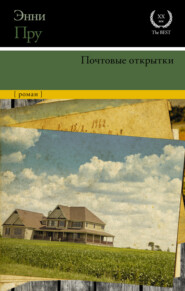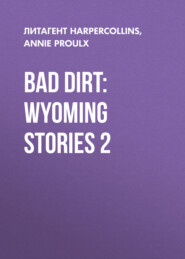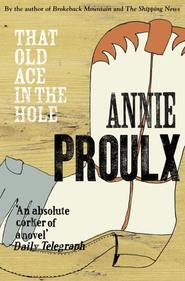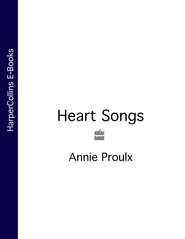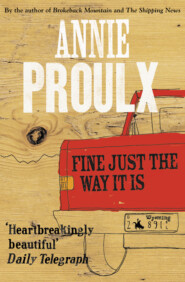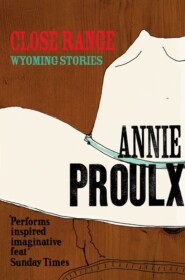По всем вопросам обращайтесь на: info@litportal.ru
(©) 2003-2024.
✖
Postcards
Автор
Год написания книги
2018
Настройки чтения
Размер шрифта
Высота строк
Поля
‘I don’t get it,’ said Mernelle. ‘I don’t get what a bomber was doin’ near the Camel’s Hump. Is there Germans on the Camel’s Hump?’
Dub roared in his stupid way. Mernelle could see the thing at the back of his throat hanging down, the black parts of his teeth and the empty gums on the left where the train men had knocked his teeth out.
‘Don’t worry about the Germans. Even if they made it across the ocean what the hell would they do up on Camel’s Hump? “Ach, Heinz, I am seeink der Blood farm und der dangerous Mernelle collecting ze milkveed pods.” ’ Dub’s grin hung in his face like an end of wet rope.
The food lay on Loyal’s plate as Mink had sent it along, the ham hanging a little over the edge, the cone of potato rising, a single iceberg from a frozen sea.
Loyal stood up, the yellow kerosene light reaching as high as his breast, his face shadowed. His leaf-stained fingers bunched, braced against the table. ‘Got something to say. Billy and me has had enough of this place. We’re pullin’ out tonight. She’s waitin’ for me right now. We’re pullin’ out and going out west, someplace out there, buy a farm, make a new sun. She got the right idea. She says “I’m not even goin’ to try to see my folks. Suit me good if I never have to see one of them again.” She’s just goin’. I wanted to set it straight with you, give you some idea. I didn’t come back for no goddamn dinner. Didn’t come back to listen to horseshit about Germans and potatoes. I come back to get my money and my car. Ask you to tell her folks she’s gone. She don’t care to see them.’ As he said it he knew that’s what they should have done. It seemed so easy now he couldn’t understand why he’d fought the idea.
There was a silence. A discordance spread around the table as though he had blindly hit piano keys with a length of pipe.
Mink half-stood, the hair hung down over his eyes. ‘What in hell are you sayin’! This your idea of a joke? All I ever hear from you for ten years is how you think this place oughta be run, now you say just like you was talkin’ about changin’ your shirt that you’re pullin’ out? For ten years I been hearin’ about what you wanted to do with this place, how you wanted to switch off the Jerseys over to Holsteins, “get a milkin’ machine after the War as soon’s we get electricity in, specialize in dairy.” Get the pastures and hayfields up, alfalfa, build a silo, grow more corn, concentrate on commercial dairy farmin’. Profit. Put the time into dairyin’, don’t bother with no big garden, or pigs or turkeys, it’s quicker and efficienter to buy your food. I can hear you sayin’ it now. You said it until my ears turned blue. Now this. You expect me to swallow this like sweet cake?
‘Hey, mister, tell you what else you said. You bitched and whined about the juniper movin’ into the fields, talk half an hour about the orchard, suckers, deadwood, the bull spruce is chokin’ out the spring in the pine tree corner you said, west hayfields ain’t been cut in three year, full of cherry trash. That’s what you said. Said you wished the day had forty hours of light so’s you could get somethin’ done.’
Loyal hardly heard him, but saw the rubbery folds from the wings of his nostrils to the corners of his mouth, saw the cords in Mink’s neck, thought of the glistening strings just under the skin, thought of the arteries swelled with ropes of blood the size of his finger, thought of the crackling sound of rib bones when he kicked in a fox’s chest.
‘You can’t leave us run this farm alone,’ said Mink in his buzzing voice, the self-pity getting into his rage. ‘Jesus Christ, your brother’s only got the one arm and my health is down since the damn tractor laid on my chest. I was up to my health I’d beat the shit out of you. You’re not worth a pig’s patootie. You tell me how in the hell Dub and me can hand-milk nineteen cow alone, two of them damn Holsteins of yours, the one holds her milk back, and kicks. Christ I hate that cow’s eyes. You son of a bitch, we just can’t do it.’
‘Goddamnit, the Holsteins are good-natured cows, better than them little Jerseys you got. They give damn near twice as much milk as any Jersey.’ He tumbled into the relief of the old argument.
‘Yes, and look how much they eat. And half the butterfat of the Jerseys. The Jerseys is made for this country. They can make out on thin pasture and keep a farm going. They’re rugged. Tell you another thing. You just try walkin’ off the farm they’ll have your ass in uniform so fast it’ll take your breath away. There’s a War on, in case you forget. Farm work is essential work. Forget out west. Don’t you read no papers? Don’t you hear no radio programs? Them out west farms dried up and blowed away in the Dust Bowl. You’re stayin’.’
Dub popped a wooden match with his thumbnail and lit his cigarette.
‘I got to go,’ said Loyal. ‘I got to. Oregon or Montana – somewhere.’
‘Put the record on again, Charlie,’ said Dub, ‘everybody likes to dance to that one.’ The smoke streamed out of his nose.
Jewell put her hands to her cheeks and drew down on them, stretching her face and exposing the red inner lids of her eyes behind her glasses. ‘I don’t know,’ she said. ‘What about the Army Dinner, we’re puttin’ on the Army Dinner Saturday night, the big beef stew dinner in the cafeteria style, Army style. I was expectin’ you to take me down to the church on Saturday mornin’. You can stay for that. Billy’s one of the ones that wears the chefs hats and ladles out the food. She has to stay for that.’
‘It’s on Billy’s account we got to go tonight. There’s certain reasons. No good to talk about it. I’m goin’.’ He leaned wildly at them, the black hair curling at the opening of his shirt where the blue-white skin showed.
‘Well Jesus Christ, I see the whole thing. You knocked her up. She wants to clear out so nobody don’t know. There’s a word to describe a fella like you lets himself get backed into a rutty corner where he can’t turn around,’ the voice squeezed along, ‘but I won’t say it in front of your mother and sister.’
‘Hey, you leave, Loyal,’ said Dub, ‘you’re finishin’ off this farm.’
‘Well I knew this was goin’ to be like takin’ a bath in boiled shit, but I didn’t know it was goin’ to be this bad. Can’t you understand nothin’? I’m goin’.’
He ran up to the slant-ceilinged room he shared with Dub, leaving the ham on his plate, leaving his chair turned away from the table, leaving the fly-spotted mirror reflecting Mernelle’s face. He hauled out the old valise, opened it and threw it onto the bed. And stood a long minute with the shirts bunched up in his hands, the valise gaping like a shout. Down there Mink was firing up, bellowing now, something smashing and rattling – door to the pantry. Loyal dropped the shirts into the valise, and afterwards believed that was the moment when everything shifted, when the route of his life veered away from the main line, not when Billy dumped beneath his blind rutting, but as the shirts collapsed in their cotton limpness.
He found Dub’s bottle in a boot in the closet, tightened the cap and tossed it in, working the stiff strap through the valise buckle as he came down the stairs double-stride, hearing Mink hammering now, seeing the son of a bitch nailing the kitchen door shut. So he couldn’t get out.
He was across the room in a few seconds. He kicked out the window and stepped over the raking glass onto the porch, leaving it all, the trapline, the rough little Jerseys, the two Holsteins with their heavy flesh-colored udders. Dub’s oily rags, and the smell of old iron in the back of the barn, the wall up by the woods. That part of things was over. It was over in a rush.
Down on the town road he thought it was a sour joke how things had turned out. Billy, always yapping about moving away, getting out, making a new start, was staying on the farm. He, who’d never thought beyond the farm, never wanted anything but the farm, was on his way. Clenching the steering wheel.
Something was sticking in his backside, and he felt around, grasped Mernelle’s ocarina, the swirled novelty pattern of the Bakelite scarred from kicking around the floor. On the sides were decals of donkeys carrying panniers of cactus. He started to crank down the window to throw it out, but the window slipped off the rail again when it was only a crack open, and he threw the ocarina into the backseat.
It was almost dusk, but at the low place where the meadows swept the trees off to the sides he pulled over to take a last look. But jammed the spurting flashes of what had happened. Had happened and was done.
The place was as fixed as a picture on a postcard, the house and barn like black ships in an ocean of fields, the sky a membrane holding the final light, and there were the blurred kitchen windows, and up behind the buildings the field, the rich twenty-acre field propped open toward the south like a Bible, the crease of the water vein almost exactly in the center of the ten-acre pages. He fished in the valise and got Dub’s bottle, swallowed the cold whiskey. Beautiful pasture, four or five years of his work to bring that field up, none of Mink’s labor, his, draining the boggy place, liming and seeding to clover, plowing under the clover three years running to build up the soil, get the sourness out, then planting alfalfa and keeping it going, look at it, sweet good stuff, nutty, full of nourishment. That’s what made those cows give the butterfat, nothing Mink did, but him. Loyal, the best pasture in the county. That was why he had wanted to go up above the junipers, even though Billy didn’t care about the field and couldn’t tell good fields from bad, not to do what she thought he wanted, but to look at his pasture from above.
‘I heard it all, now,’ she said. ‘Looks like any stupid old field to me.’ She shook her head. ‘I don’t know if I can make something out of you or not. Loyal.’
The field looked like black-green fur in the dull light.
‘That’s your last look,’ he said, laid Dub’s bottle in the glove compartment and threw the car into first. Out of the corner of his eye he half-marked a white dot up in the field. Too big for a fox, wrong shape for a deer. And no stumps in that field.
But he was fourteen miles away from home and half across the bridge, stepping gingerly on the brake to keep from hitting a burrcovered stray, before he figured it out. The dog. The dog was up in the field right where he’d told him to sit. Still waiting. Jesus Christ.
2 Mink’s Revenge (#ulink_ed5e1f43-14fd-5247-be55-82b691d60f20)
MINK, PANTING IN unsatisfied rage, limped through the house throwing down Loyal’s things, a model airplane impaled on a nail in the front hall, school photos in warped folders edged with gold – Loyal the only one in his class with wavy hair, handsome – standing in a crowd of frames and button boxes on the piecrust cherry table in the front room. The 4-H ribbons, red, white and blue for calves, pasted on a piece of propped cardboard, the high school diploma with its black pointed letters proving Loyal had completed courses in Agriculture and Agronomy and Manual Training, the Dairy Management book from his single year at the agricultural school, dark blue and heavy, the certificate for pasture improvement, a newspaper clipping with a photo of Mr. Fuller, the County Agent, handing the certificate to Loyal, all these things he threw on the floor.
He crammed Loyal’s barn coat into the kitchen stove, scraped the untouched food on his plate in after it. Smoke swelled out of a hundred stove cracks and eddied along the ceiling before curling into the stream of warm air pouring out through the smashed window. Dub fumbled behind the pantry door for cardboard to tack over the window and Jewell, her face red and her eyes narrowed to slits, juggled the stove damper. A roaring came from the stovepipe as the creosote in the bend of the elbow caught and heated the stinking metal to a dull red.
‘Christ, Ma, you’re workin’ on a chimbley fire, damper the goddamn thing down,’ shouted Dub.
Here came Mink, cool now, but with vicious eyes, coming downstairs with Loyal’s .30–.30, limping through the kitchen, leaving the door open. Dub guessed the old man would throw it in the pond. Later he could drag through the mud with a potato fork and maybe get lucky. Probably take a day of cleaning and oiling to get it back in shape, but it was a good rifle and worth the trouble. Laid across the windowsill of the hayloft he could shoot it, get his deer like anybody else. He pieced and tacked cardboard boxes, all dots and creases, to the window frame, holding the cardboard in place with his left knee while he hammered.
‘I’ll cut some glass, put it in tomorrow if somebody’ll give me a hand puttin’ in the points.’ But he was pale.
Jewell swept up the curving slivers, putty chunks and dust, stoutly bending over, her print dress riding up, exposing the ribbed cotton stockings, the flesh-pink dip from Montgomery Ward.
‘There’s glass in the food, Ma, there’s glass all over the table,’ said Mernelle. ‘There’s big pieces on the porch, too.’
‘You can start by scrapin’ the plates, and don’t put it in the pig pail. Have to take it out and heave it. I don’t know about the hens, if they’d pick up the glass, but I suppose they would. Heave it out back of the garden.’
There was the slamming sound of a shot from the barn, then another, and, after a long interval, a third. The cows were bawling like alligators, flat roars, stamping, rattling their stanchions. They could hear Father Abraham’s bellow above all the others.
‘That is a hell of a thing to do,’ said Dub. ‘That is a hell of a thing to do.’ Jewell shuddered, her fingers across her mouth, watched Dub go out to the entry, jerk his coat off the nail. Back through the kitchen to the woodshed door.
‘Be careful,’ she said, hoping he knew what he should be careful about. Mernelle started to snivel, not over the cows, but because of Mink’s rage that was spurting out of him like jets of water from a kinked hose. He could chop them all with the axe.
‘Get hold of yourself and go up to bed,’ said Jewell gathering the plates from the table. ‘Go on now, I got enough trouble without you blubberin’ around the place.’
She was sitting at the table when Mink came in. She saw how a little burst of greyed hairs had grown on his cheek since morning. He threw the rifle up on top of the cupboard without cleaning it and sat across from her. His hands were steady. The streaked hair stuck out from under his cap, the bill like a menacing horn over his eyes.
‘By god, that’s two of them we don’t have to milk.’ There were fine drops of blood across the front of his overalls.
Mist rose from the brook like a stage curtain. In midmorning the trees still bent wet and silent. Every surface was coated with beaded drops that paled bark, wood, paint, soil. The coming and going of Dub and Mink made dark paths across the porch, through the grass like stiff hairs with seed pearls at the tips. The top of the barn dissolved, the pigs rooted in the manure pile, heaving bubbles on the surface of a black swamp.
Mink was out before daylight. Jewell struggled from sleep to the sound of the tractor dragging the Holsteins down to the swamp where the dogs and foxes and crows would find them. The engine echoed and dotted through the fog.
‘We could of at least took the meat,’ she thought, and Mink’s anger seemed to her so wasteful he would have to burn for it in a hell as crimson as the landscape seen through the red cellophane strip on cigarette packs. Not a new thought.
He had done a hundred things. She could not forget all of them. The knock-down slaps, the whalings he gave the boys, same as he’d had himself. Loyal, maybe three years old, stumbling across the muddy barnyard in his little red boots, bellowing like a lost calf but still hanging onto his empty milk bucket. It was a quart cream can, really. The milk all spilled when he did in fresh manure. Mink had slapped him halfway across the barn. ‘I’ll learn you to watch your goddamn step! Don’t spill the milk!’ Loyal’s broken nose had swelled up to the size of a hen’s egg by the time he got to the porch steps, the cream can hanging, and for two weeks the kid had slunk around dodging Mink, looking like a raccoon with his double black eyes. When she’d run out to the barn in her own fury Mink’d been astonished. ‘Listen here. We got to start him young. We got to. It’s for his own good. I went through it. And guarantee you he won’t spill no more milk.’ Nor had he.






